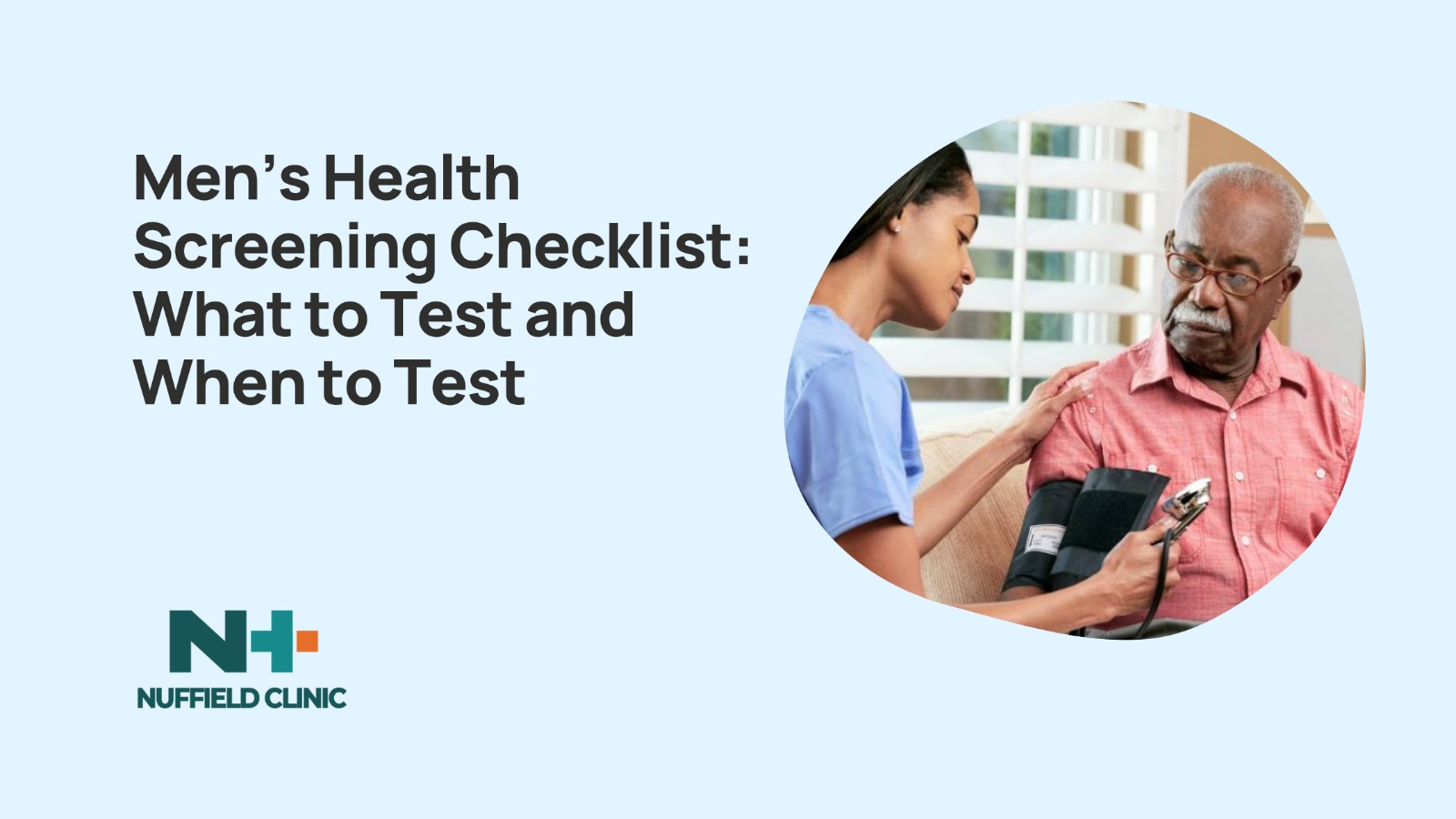
A guide for better health, early detection, and proactive living, brought to you by Nuffield Clinic
Do you wonder if you’re doing enough to stay healthy as you age? Have you ever skipped a check-up, delayed getting tested, or assumed feeling “fine” meant everything was okay? If you’re in your 20s, 40s, 60s, or anywhere in between, this article is for you. We created it for men who want to take a more proactive role in their health but aren’t sure where to start.
In this guide, we break down what health screenings you should be doing, when to do them, and why they matter. With early detection often making the difference between simple treatment and serious complications, knowing what to test and when can help you prevent illness, catch problems early, and lead a longer, more energetic life.
Men’s Health Screening Checklist
Many men pride themselves on their resilience. But too often, this translates into avoiding check-ups, delaying doctor visits, and ignoring early signs of illness. The truth is, many serious health conditions develop quietly, without noticeable symptoms, until they’ve progressed into something more dangerous. That’s why a clear, age-appropriate health screening plan can literally be a lifesaver.
Preventive care isn’t just a medical recommendation; it’s a lifestyle choice. Understanding what to test and when to test empowers men to take charge of their health, not just for themselves, but for the people who rely on them.
Why Preventive Screenings Matter
Many studies show that men, especially between the ages of 18 and 64, are far less likely to seek regular health checkups compared to women. For instance, Dr. Joseph Alukal observed that men often wait until symptoms become severe before seeking help, sometimes too late for simple treatments.
Preventive screenings, however, offer a powerful solution: they catch potential problems early and allow for manageable interventions before illness becomes advanced.
A regular check-up isn’t just about a quick blood pressure reading. It’s a conversation. It’s a moment to bring up concerns, big or small, and to check in on all aspects of health: physical, emotional, hormonal, and even sexual well-being.
What Every Man Should Be Doing, Regardless of Age
No matter your age, there are several key components of health that deserve routine attention.
Annual Physical Exam
For men over 50, an annual physical is non-negotiable. Younger men, especially those in their 20s to 40s, should still aim for a full exam every three to five years. These check-ups include vital sign monitoring, weight and height tracking, lifestyle discussions (like alcohol, nicotine, and drug use), and early risk assessments for chronic conditions.
Routine Blood Tests and Urinalysis
Simple blood and urine samples can reveal a lot about your health. These tests assess cholesterol, blood sugar, thyroid function, kidney health, and more. Catching imbalances early can prevent serious diseases like diabetes, cardiovascular issues, and chronic kidney disease.
Blood Pressure Monitoring
High blood pressure, or hypertension, often shows no symptoms but can silently damage your heart, kidneys, and brain over time. Even if your readings are normal, having them checked at least every two years is important. If you smoke, have diabetes, or have a family history of heart disease, you may need to check more frequently.
Mental and Emotional Health
Mental wellness is as important as physical health, but is often overlooked. Men may experience depression, anxiety, or emotional distress in ways that aren’t obvious. Irritability, risky behaviour, or substance misuse can all be signs. That’s why a yearly mental health check should be part of your health routine. If you’re feeling off, don’t shrug it off.
Self-Exams
Men should get familiar with their bodies. Monthly self-checks for testicular lumps, changes in skin moles, oral health issues, and even breast tissue irregularities can help identify warning signs early. While some organisations question the benefit of regular testicular self-exams, they remain a useful tool for self-awareness.
Age-Based Health Screening Guide
Ages 20–39: Laying the Foundation for Long-Term Health
Young men often feel invincible, but this is exactly the time to establish healthy habits and get baseline health data.
- Physical Exams should be done at least every three years.
- Blood Pressure should be checked twice a year.
- Cholesterol testing starts between the ages of 20 to 35. If your levels are normal, a five-year gap between tests is fine. If you smoke, are overweight, or have a family history, check more frequently.
- Testicular Self-Exams should be performed monthly to notice any new lumps or changes.
- Vision Testing is recommended yearly.
- Electrocardiograms (EKGs) may be advised starting at age 30 to assess heart rhythm.
- Sexually Transmitted Infections (STIs), including HIV, syphilis, chlamydia, and gonorrhoea, should be tested for regularly if you’re sexually active.
- Hepatitis C requires a one-time screening between the ages of 18 and 79.
- Vaccinations like Tdap (every 10 years), annual flu shots, and HPV (if under 26) are important. Hepatitis B vaccines may also be needed if not received during childhood.
Ages 40–49: Prevention Becomes a Priority
As metabolism slows and risks increase, screenings become more frequent and targeted.
- Physical Exams should now occur every two years.
- Blood Pressure should be checked annually.
- Diabetes Screening should start at age 35 or 45, especially for men who are overweight or sedentary.
- Colorectal Cancer Screening begins at age 45. A colonoscopy is the gold standard and should be repeated every 10 years, unless risk factors suggest otherwise.
- Prostate Health discussions begin now. While not all men need PSA testing in their 40s, African American men and those with a family history may begin earlier.
- Eye Exams are recommended around age 40 to catch early vision changes and screen for eye disease.
- Heart Health Assessments should start at 45, or even at 30 for Aboriginal and Torres Strait Islander men. This includes evaluating cholesterol, blood sugar, family history, and smoking status.
Ages 50 and Older: Full Spectrum Preventive Care
At this stage, annual screening is key. Many conditions become more common with age, and early detection remains critical.
- Annual Physicals become a yearly routine.
- Blood Pressure and Diabetes tests continue annually or as recommended.
- Colorectal Cancer Screenings should be ongoing until at least age 75, with colonoscopies every 10 years.
- Prostate Cancer screenings remain nuanced. Men should continue discussions with their doctors about the risks and benefits of PSA testing and prostate exams.
- Skin Checks should be done yearly to monitor moles or new spots for signs of skin cancer.
- Bone Health becomes a concern, particularly for men over 70. If you’re in your 50s with low BMI or other risks, bone density testing may start earlier.
- Eye Exams are recommended every 1–2 years after age 65 to watch for cataracts and glaucoma.
- Hearing Tests every three years after age 50 help detect age-related hearing loss.
- Lung Cancer Screening with low-dose CT is advised annually for current or recent smokers aged 50–80 with a significant smoking history.
- Vaccinations include annual flu shots, shingles vaccine (after age 50), and pneumococcal vaccine at age 65. Additional vaccines may be needed depending on lifestyle and health history.
- Coronary Screening should be considered yearly after 50, particularly if risk factors are present.
- Abdominal Aortic Aneurysm ultrasound screening is recommended between the ages of 65–75, especially for men who have smoked.
More Than Just Screenings: The Lifestyle Factor
Even with perfect screening habits, lifestyle is the foundation of long-term health. A nutritious diet, regular physical activity, and maintaining a healthy weight significantly reduce the risk of many diseases. Men should aim for at least 150 minutes of aerobic exercise per week and include strength training as well.
Sleep becomes increasingly important, especially in your 50s and beyond. Managing stress, whether through mindfulness, therapy, or community connection, is just as vital. Reducing alcohol intake, avoiding tobacco, and discussing any substance use with a healthcare provider are steps worth taking.
If you’re considering starting a family, pre-conception health also matters. Talk to your doctor about how your weight, age, smoking habits, and environmental exposures may impact fertility and baby health.
Take Control of Your Health Today
Your health is your greatest asset, and knowing when and what to check is one of the smartest investments you can make. Whether you’re just beginning to think about preventive care in your 30s or navigating complex decisions in your 60s, you’re not alone.
At Nuffield Clinic, we offer a full Men’s Health Screening Checklist, designed specifically with your age, lifestyle, and medical history in mind. Our comprehensive evaluations include physicals, laboratory tests, and tailored consultations, helping you stay ahead of health issues before they arise.
Don’t wait for symptoms. Be proactive. Be prepared. Be well, with Nuffield Clinic.








